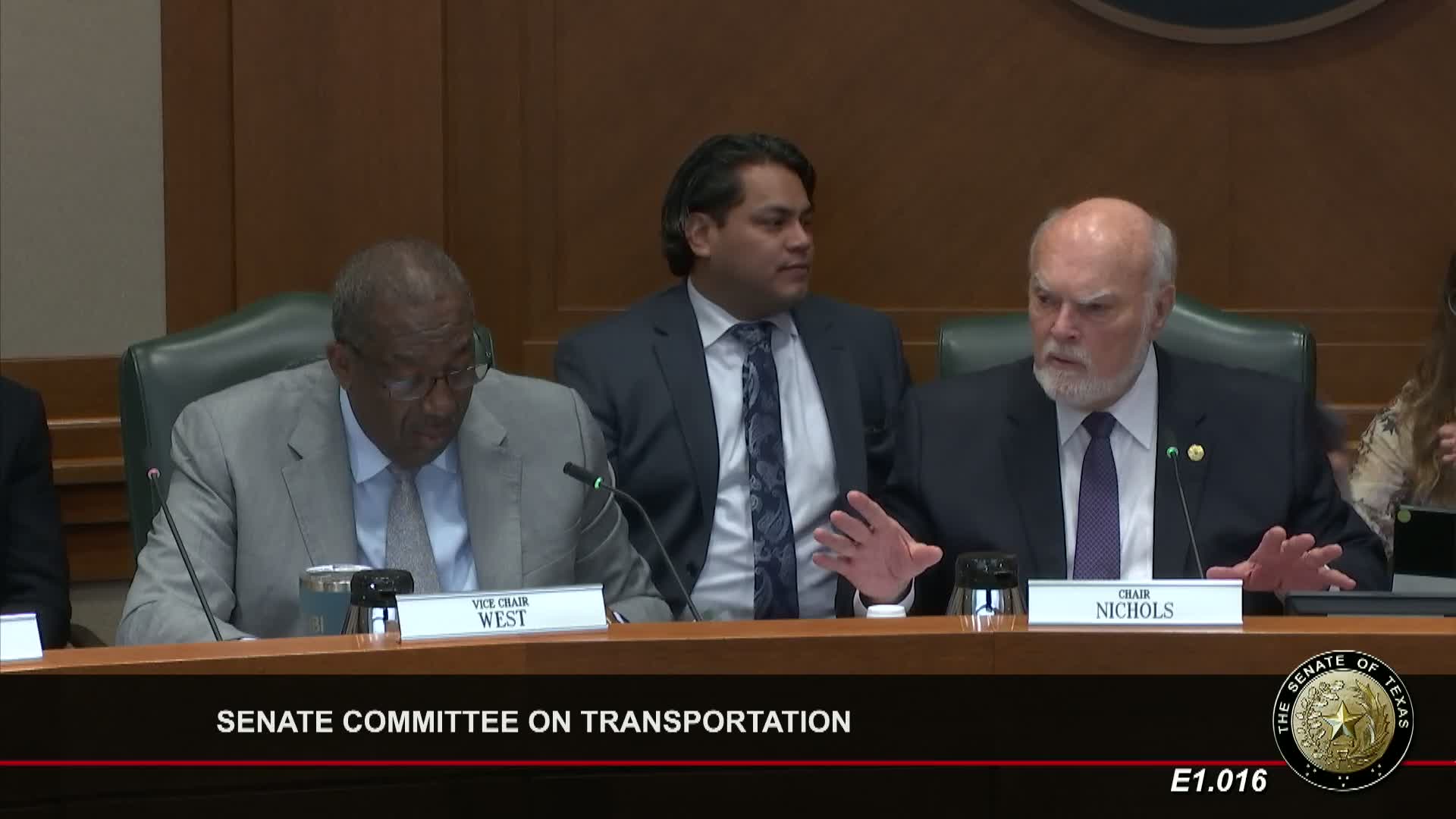Senate committee advances bill to regulate commercial autonomous vehicle operations, adopts substitute
Get AI-powered insights, summaries, and transcripts
Subscribe
Summary
The Senate Transportation Committee adopted a committee substitute and advanced SB 24 25 to the full Senate after extended testimony from industry, public-safety and consumer witnesses on liability, safety standards and oversight for commercial autonomous vehicle (AV) operations.
Senator Nichols, chair of the Senate Transportation Committee, told members that Senate Bill 24 25 would update Texas law to require automated-vehicle companies to provide information to the Texas Department of Motor Vehicles and to submit first-responder interaction plans to the Department of Public Safety before operating commercially without a human driver.
The bill, with a committee substitute adopted in the hearing, clarifies definitions (including SAE-aligned language for Level 3 operation), sets an authorization process for commercial AV fleets, and gives DMV and DPS the authority to suspend or revoke an AV operator’s authorization under specified circumstances. "If in the rare situation you end up with an operator who is not doing a good job, then at some point there needs to be some, regulation by the state and that is you have authority to operate without a driver or you do not until you correct whatever the deal is," Senator Nichols said during his presentation.
The committee substitute, distributed to members and stakeholders shortly before the hearing, made several changes described by the author: alignment of definitions with SAE standards, clarification that penalties are assessed at the fleet (authorization-holder) level rather than per vehicle, an expedited administrative review process, and clarification that commercial AVs remain subject to existing commercial-motor-vehicle law where applicable.
Public testimony spanned industry groups, safety and policy advocates and private citizens. Terry Hall, testifying for a group opposing the bill, said a concern remained about liability: "The poison pill here is removing the manufacturers from any liability for the actual operation of the vehicles that they're unleashing on our public roads." David Dunmoyer of the Texas Public Policy Foundation supported the bill, saying it provides "a robust authorization process that weeds out bad actors before they even hit our roadways."
Industry witnesses described Texas as a key market and urged limited, clear rules to allow continued investment. Peter Schulz, representing Tesla's Full Self-Driving development team, said Tesla planned a robotaxi launch in Austin and praised the bill's focus on safety and innovation. Ariel Wolf, general counsel for the Autonomous Vehicle Industry Association, said: "Texas is a leader... Texas has attracted significant AV investment," and urged continued collaboration on rulemaking. Bart Teeter, formerly of Texas DPS and now with Bot Auto (a level-4 truck developer), emphasized safety benefits: "For the first time in my professional life, we may have a chance to make a significant dent" in commercial-vehicle fatalities through AV deployment.
Opponents and some committee members pressed for clarity on liability, mean time to failure/repair metrics and how enforcement would work in practice. Senator Bettencourt asked industry witnesses about uptime and mean time to repair; Tesla’s representative said reliability metrics would be clearer as the service approaches launch. In response to concerns about liability, an industry witness said he was not aware of any language in the substitute that would absolve manufacturers of liability and noted that federal defect and recall enforcement would remain applicable.
After testimony and discussion, the committee adopted the committee substitute and voted to advance the measure. The committee recorded a 6-0 vote to adopt the substitute and advance the bill with the committee’s recommendation.
The committee chair said he would continue working with stakeholders and legislative counsel to correct any drafting issues on the floor if necessary and encouraged members and stakeholders to send follow-up concerns to his office.
The committee’s action moves SB 24 25, with the substitute, to the full Senate for further consideration.
